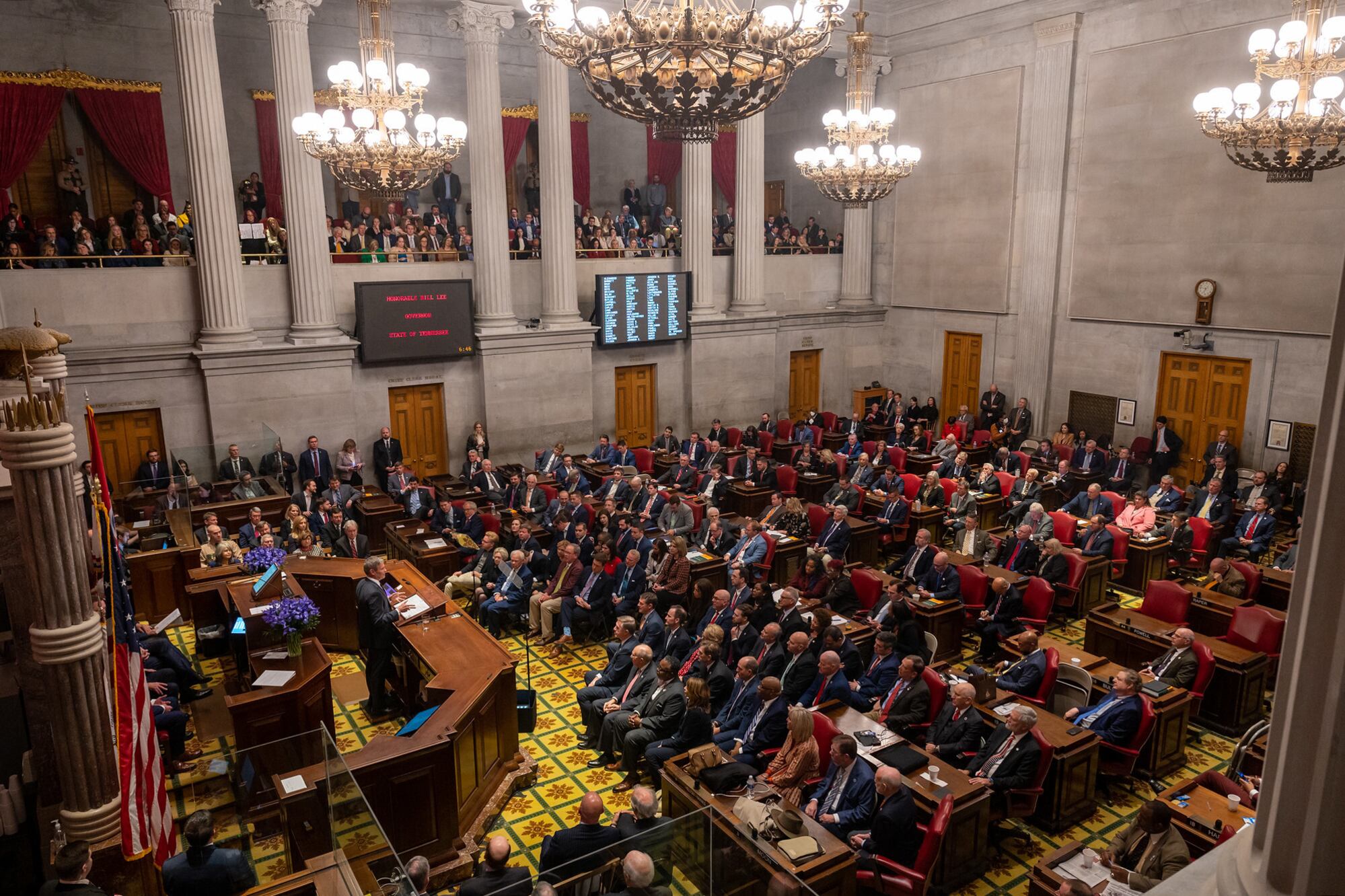Sign up for Chalkbeat Tennessee’s free daily newsletter to keep up with statewide education policy and Memphis-Shelby County Schools.
Gov. Bill Lee renewed his call for private school vouchers for any student across Tennessee on Monday, and he also set aside $144 million in his proposed state budget to pay for the new program for up to 20,000 students in its first year.
For traditional public schools, the Republican governor asked the legislature to raise the annual base pay for teachers from $42,000 to $44,500, in keeping with his pledge last year to get the profession’s minimum salary to $50,000 by the 2027-28 school year. (Raising the base pay has a domino effect and increases the pay of more experienced teachers, too.)
Lee also wants to invest $200 million to grow state parks and natural areas while simultaneously cutting corporate taxes amid a downturn in state revenues. But he maintained that Tennessee has “a very strong economy” to pay for all the changes.
The governor outlined his list of wants Monday evening during his 2024 address before the General Assembly, which will take up Lee’s voucher proposal and the budget in the months ahead.
He opened his remarks by calling Tennessee a “model for economic prosperity” and reminding lawmakers that state revenues are still 40% higher than three years ago.
However, after years of being flush with cash, the state faces a $610 million budget shortfall this year, and many lawmakers are leery of approving a universal school voucher program that Lee wants to be available to any K-12 student in 2025-26. Currently, Tennessee offers vouchers to about 3,000 low-income families in three urban counties, but his Education Freedom Scholarship Act would open them up to families in all 95 counties, eventually with no family income restrictions.

“2024 is the year to make school choice a reality for every Tennessee family,” he said, drawing a standing ovation from many legislators — but not everyone in the GOP-controlled legislature — as well as frequent jeers from some spectators in the gallery.
“There are thousands of parents in this state who know their student would thrive in a different setting, but the financial barrier is simply too high,” Lee continued. “It’s time that we change that. It’s time that parents get to decide — and not the government — where their child goes to school and what they learn.”
Lee, a Williamson County businessman who graduated from public schools in Franklin, near Nashville, touted more than $1.8 billion in new investments in public education since he became governor in 2019.
“We can give parents choice and support public schools at the same time,” he said. “You’ll hear me say that over and over again. These two ideas are not in conflict.”
The governor also released his $52.6 billion state government spending plan to begin July 1. The total was down from Tennessee’s $62.5 billion budget for the current fiscal year because of flattening revenues and expiring federal funds appropriated during the pandemic.
He proposed $8 million to hire 114 more school-based behavioral health specialists amid record reports of students experiencing stress, depression, anxiety, and other mental health challenges exacerbated by the pandemic.
Other recurring funding recommendations include $30 million to pay for summer learning programs; $3.2 million to expand access to advanced placement courses for high school students; and $2.5 million to pay for a universal reading screener as part of the state’s literacy initiative, all to offset federal funding that is drying up.
Lee is asking for $15 million in one time funding to help charter schools with facility costs.
The governor also announced that his administration will bring the legislature a bill designed to help parents oversee their child’s social media activity.
“It will require social media companies to get parental consent for minors to create their own accounts in Tennessee,” Lee said.
Such legislation would widen the state’s push against social media giants.
Last fall, Tennessee joined a coalition of states suing Meta, the parent company of Facebook and Instagram, which is accused of violating consumer protection laws and deceptively marketing its platforms to adolescents to the detriment of their mental health.
And some Tennessee school districts have joined a growing list of school systems nationwide that are suing major social media companies like TikTok and YouTube over a crisis in student mental health.
But in the wake of last year’s shooting at a private Nashville school — where three children, three staff members, and the shooter died — the governor offered no new initiatives aimed at improving school safety or decreasing gun violence, other than funding to hire 60 more state troopers.
Last year, after the March 27 tragedy, the legislature approved $140 million in grants to place an armed law enforcement officer in every Tennessee public school. But the legislature rebuffed the governor’s call for a law to help keep guns out of the hands of people deemed at risk of hurting themselves or others.
Remarks about Lee’s universal voucher plan, announced in November, drew quick responses from the leaders of the state’s two largest teacher organizations.
“The concept of universal vouchers would be costly to the state, and we urge the Tennessee General Assembly to move slowly,” said JC Bowman, executive director of the Professional Educators of Tennessee.
“In particular, we have concerns over the lack of income-eligibility requirements and accountability,” he continued. “Our state must avoid any program viewed as a tax subsidy for existing private school families or a tax bailout for struggling private schools.”
Tanya T. Coats, president of the Tennessee Education Association, said Lee’s plan shows that vouchers have never been about helping economically disadvantaged families, as the governor first characterized it in 2019.
“The goal has always been to privatize public education and use public dollars to fund private school education, which goes against our Tennessee values,” Coats said.
Marta Aldrich is a senior correspondent and covers the statehouse for Chalkbeat Tennessee. Contact her at maldrich@chalkbeat.org.






